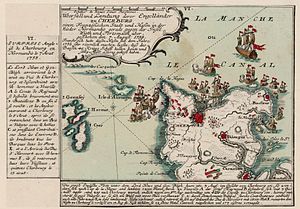Raid on Cherbourg
| Raid on Cherbourg | |||||||
|---|---|---|---|---|---|---|---|
| Part of Seven Years' War | |||||||
 Raid in Cherbourg 1758 |
|||||||
|
|||||||
| Belligerents | |||||||
|
|
|
||||||
| Commanders and leaders | |||||||
|
|
Unknown | ||||||
| Strength | |||||||
| Unknown | 3,000 | ||||||
| Casualties and losses | |||||||
| Light casualties | Light casualties | ||||||
The Raid on Cherbourg took place in August 1758 during the Seven Years' War when a British force was landed on the coast of France by the Royal Navy with the intention of attacking the town of Cherbourg as part of the British government's policy of "descents" on the French coasts.
Since 1757 the policy of the British government to use their naval superiority to launch raids against the French coast, to act as a diversion - drawing French forces and resources away from Germany where Britain's allies Prussia, Hanover and Brunswick were under severe pressure. In Autumn 1757 a British expedition to Rochefort had captured an offshore island, but not made an effort to capture the town. In 1758 the Duke of Brunswick asked the British to put this policy into action as his Allied force was being pushed back. A large naval and military force was assembled in southern England under the direction of George Anson, the First Lord of the Admiralty. In June 1758 the British had launched a Raid on St Malo. Following the perceived success of this, a further raid was planned and it was announced that Prince Edward, the younger brother of the Prince of Wales would accompany the expedition.
The British forces were under the command of Lieutenant General Thomas Bligh with the offshore naval contingent commanded by Richard Howe. They cruised along the coast of Normandy threatening a number of ports, before arriving outside Cherbourg on 7 August. The conditions were favourable and they were able to make a successful landing at Urville-Nacqueville beach. Once ashore they brushed aside the small French force defending Cherbourg, and stormed it, capturing the town. They set about destroying the fortifications and port. On 16 August, the British left Cherbourg and re-embarked having stayed exactly a week.
...
Wikipedia
